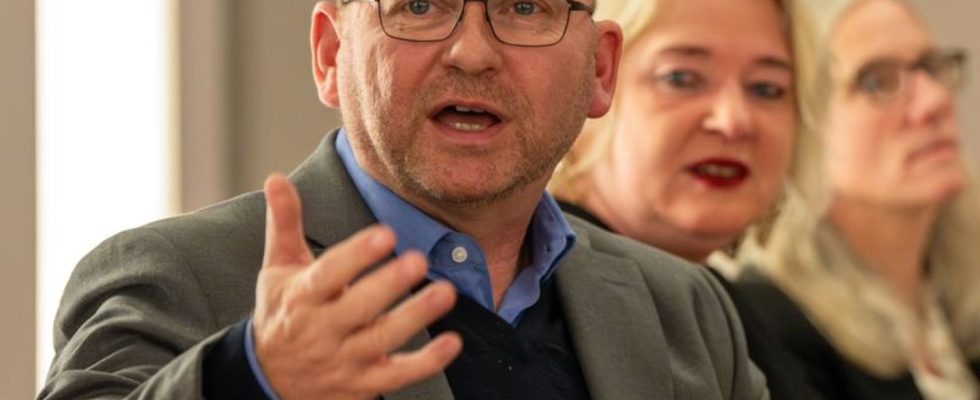Service union
Verdi sees itself on the rise – Harsh criticism of the traffic lights
Verdi boss Frank Werneke criticizes that the traffic light is trying to squeeze the high costs of the climate-friendly restructuring of the economy and society into the normal federal budget. The counter-financing is irrelevant and sometimes absurd. photo
© Soeren Stache/dpa
A year of massive warning strikes was worth it for Verdi. The union is not at all satisfied with the traffic light policy. The Verdi boss fears increasing “distribution conflicts”
“Distribution conflicts will increase”
Werneke sharply criticized the government’s handling of the Federal Constitutional Court’s budget ruling. The traffic light is trying to squeeze the high costs of the climate-friendly restructuring of the economy and society into the normal federal budget. The counter-financing is irrelevant and sometimes absurd – such as the cuts in subsidies for farmers, the billions in demands on the Federal Employment Agency, the cuts in pension subsidies and in federal funding for public transport in the states. One of the main causes of the population’s dissatisfaction with traffic lights is the recent increase in the CO2 price without compensation through social climate money. “Distribution conflicts will increase, and the whole thing is a daily celebration for the AfD,” warned Werneke.
Promised reforms eagerly awaited
Verdi, on the other hand, is waiting “longingly” and “with a certain impatience” for promised reforms: Werneke mentioned the promised plans for more collective bargaining and collective agreements, but also the announced pension and hospital reforms. Without reforming the debt brake or creating a special fund for transformation, the state would not be able to make the necessary billions in investments in the economy and society, said Werneke.
Plus almost 1.9 million Verdi members
On his own behalf, Werneke was satisfied: 2023 was Verdi’s most successful year since the union was founded in 2001. Around 193,000 new members joined Verdi in 2023. 152,000 would have had to be deleted from the members’ database – 118,000 because of resignation, otherwise because of death or switching to other unions or dismissals due to lack of contributions. The number of members rose by 2.16 percent to almost 1.9 million. Regionally, the percentage increase was particularly large in Saxony, Saxony-Anhalt and Thuringia at 3.23 percent. There was an increase of 15.8 percent among those under 27 years of age. However, Werneke admitted that this is not a long-term trend reversal towards increasing membership numbers. Because many at Verdi belonged to the baby boomer generation before retirement, others quit when they changed employers. By 2016, Verdi had over 2 million members.
Greater focus on working time
In terms of collective bargaining policy, after the conclusions for the public service of the federal states, Deutsche Post and in many other collective bargaining areas with sometimes massive warning strikes, 2024 will not be a boring year either, announced Werneke’s deputy Andrea Kocsis. In general, the following applies: “The issue of working hours played a minor role given the high inflation, but the issue is coming back into focus.” According to deputy bosses Kosic and Christine Behle, collective bargaining disputes are taking place at Postbank, in the printing industry, at Telekom, the private banking industry, large health insurance companies, local public transport companies – and from January 18th at Lufthansa. The negotiations here are scheduled to last until mid-March. Behle expressly “did not want to rule out” industrial action at Lufthansa.
For the public sector, Behle announced that Verdi would focus more on relieving the burden on employees. This will also be served by a large employee survey on working hours starting in January. Behle mentioned shorter working hours and other relief measures as possible topics in the collective bargaining round that will start in a year for the approximately 2.5 million federal and local employees.

